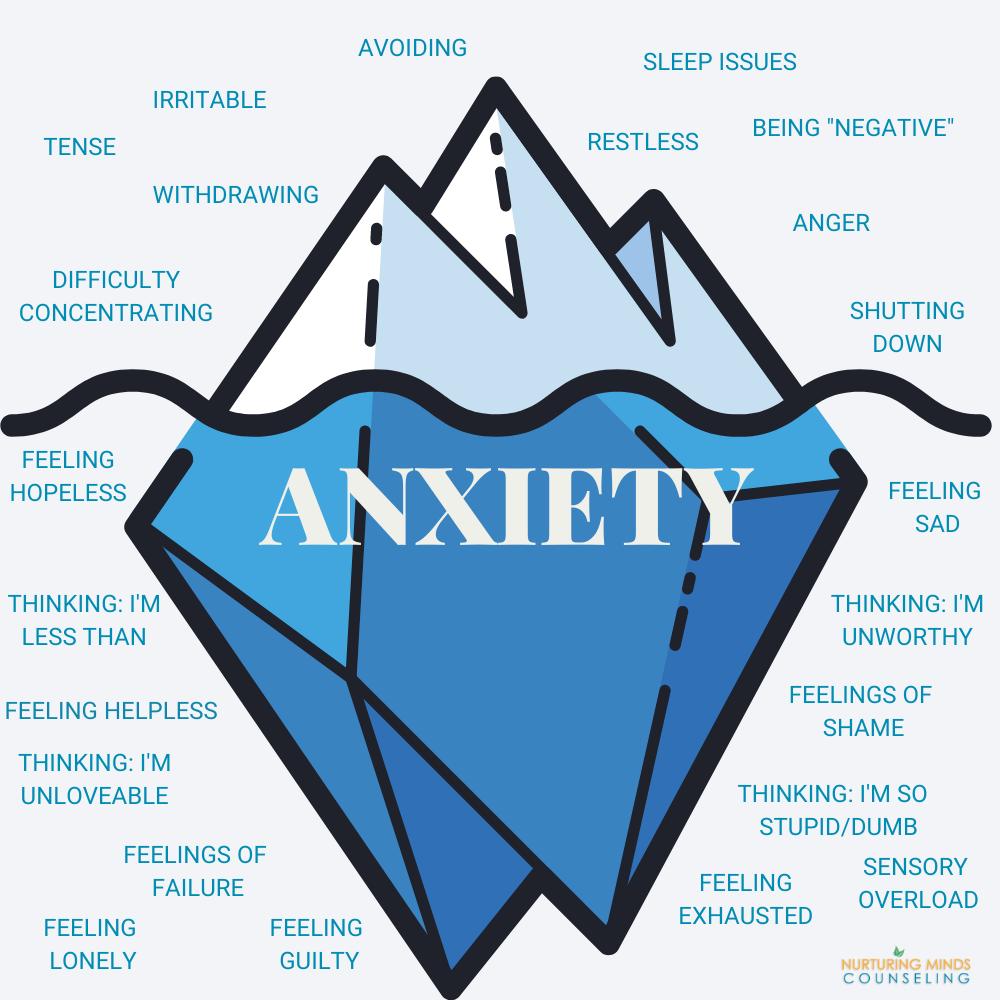Hey All! My name is Diana Garcia, and I’m a Licensed Mental Health Counselor in Florida, owner of a Private Practice called Nurturing Minds Counseling.
Do you struggle with anxiety? If so, do you feel confused or overwhelmed about explaining it to someone else? Then either watch the video below where I go through seven tips on how to explain anxiety to someone or scroll down to read the blog instead.
Watch the video on “How to Explain Anxiety to Someone” here:
Read the blog on “How to Explain Anxiety to Someone” here:
I want to first talk about how common it is to feel unsure how to approach having this conversation with someone. I often hear concern from my clients that others might not truly understand or instances in the past when a similar discussion didn’t go as planned. I also hear the other end of the spectrum when I’m working with a client whose partner struggles with anxiety, not feeling sure what to do or what’s going on. But there’s usually a genuine desire to understand and learn how to be supportive.
Tip 1: You need to get clear on your anxiety.
You first have to understand what your anxiety looks like and how it shows up in your life. Maybe you’ve already done some of this work personally or with a therapist. This is when you clearly understand what type of anxiety you have because there are different types of anxiety, including Generalized Anxiety Disorder, Social Anxiety Disorder, Panic Disorder, to name a few. All these different disorders fall under the umbrella of Anxiety Disorders. So it’s helpful that you understand, what if any, the anxiety you have (and there might be some overlap). It’s also beneficial for you to answer the following questions for yourself:
- What triggers your anxiety?
- What are the thoughts that show up?
- What are the feelings that show up at the moment?
- What are the physical sensations?
- What do you do in those moments? How have you handled it before?
- What is your relationship with anxiety-like now? Is it something you believe you handle well? Or do you struggle at times (and that’s okay too)?
- How does it show up in these different areas of your life?
Once you’re clear on what this relationship with anxiety is like, it will be much easier for you to explain anxiety to someone else.
Tip 2: Describe your experience with specific details.
You’re going to want to get specific when describing your anxiety to someone, really get into the weeds here. You want to get clear on explaining the different components of your anxiety, including:
- The thought component. What do you think before a potentially triggering situation, in the moment, and afterward? What anxious thoughts show up for you?
- The physical sensations. This is a big part of discussing anxiety and how to explain what anxiety feels like. It’s getting in the specific physical symptoms that show up for you. When you’re amid anxiety, your fight-flight-freeze has kicked in which is your nervous system getting activated which is why you experience physical sensations.
- The behavioral component. What do you do in the moment behaviorally when your anxiety shows up? What is your tendency? Do you tend to avoid it? Do you want to get away as fast as possible? Have you figured out tools and techniques to help you deal with it or cope in the moment?
So when you’re having this discussion, you can explain step by step what happens to you when you’re experiencing anxiety. For example, if you struggle with Social Anxiety, you would go through describing the following:
- Trigger: Being invited to a social event.
- Thoughts before the event: Maybe I shouldn’t go? It might be too difficult and I can’t handle it. Others are going to know I’m so weird.
- Thoughts during the event: People are judging me or looking at me weirdly. I didn’t pick the right outfit; I’m not fitting in. Others think I’m awkward, which causes me to have physical symptoms.
- Physical Symptoms: I get hot, sweaty, and my heart starts beating faster.
- Thoughts during the event: OMG, people know that I’m anxious, they can figure it out. They know that I’m struggling here, which makes me even weirder in their eyes.
- Behaviorally during the event : Desire is to get the hell out of there. Maybe sometimes I make an excuse and leave the event. Other times, I get a little bit more irritable with my partner or with people around me. Sometimes I just shut down and don’t engage because it feels uncomfortable.
Helping this person understand all these moving parts can be illuminating because maybe they see you disengaging and interpret it as you just not caring.
Tip 3: List your specific triggers
Remember your anxiety and what brings it on is individualized to you, so it’s beneficial to list what can trigger your anxiety when explaining it to someone else. Sticking with the Social Anxiety Disorder example, you may struggle in big social settings, but you’re fine when it comes to intimate settings, or vice versa. It all depends on you, but you might also notice patterns. Or let’s say you struggle with a Specific Phobia, a phobia of dogs. Explaining what can trigger you, such as is it just being around a dog? Or is seeing a dog on tv or a movie difficult for you? That way, if you have an anxious response and this individual is around, they already understand what potentially could be happening for you.
Tip 4: Explain how you feel after an anxiety-provoking situation.
It’s pretty common to feel worn out, drained, and not have the capacity or energy for much else after you’ve had a moment of intense anxiety, regardless of how you handled it. I find that many of my clients need a reset and time to recharge because they’re trying to fully get their body and mind back to a sense of homeostasis. I find this explanation can be beneficial if you live with someone and they seem confused by your response when you’ve come home after dealing with an anxiety-provoking situation. They might think you did so well at the party (because at this point, they understand that social events are complex for you), so they don’t know why you’ve shut down now that you’re home or seem irritated.
Also, if you feel like you didn’t handle it so well because that happens since you’re a human, that’s okay too. You want to explain what happens in your head and feelings when you feel like you didn’t show up the way you wanted to. I often hear some form of “I’m so dumb,” “I can’t believe I struggled with that,” or “I feel like a failure because I couldn’t deal with that, and now I’m feeling shameful.” It might even be constructive to explain to this other person what type of support you need in those difficult times.
Tip 5: Provide examples from your life.
People understand better with stories, so if you can provide specific examples of what this looks like in your life when you’re triggered, it will be easier for the other person to grasp. Whether it’s from a long time ago or something recent. Again, be descriptive such as :
- Your mind feels like it’s ongoing on this weird loop, and you can’t stop it.
- You continually consider the worst-case scenario and are scared that something terrible will happen.
- You feel a tightness in your chest like an elephant is sitting on your chest.
- You feel like you can’t trust your mind because it starts spitting out all these odd thoughts that freak you out.
- You feel so overwhelmed at times and paralyzed on how to move forward.
Tip 6: Be clear that this is a Disorder.
This isn’t just you like stressing out or freaking out, and you can’t just get over it. This is an actual medical disorder. That’s why there’s counseling and treatment for it. I don’t think the intention is to be invalidating when people make comments such as “well, just get over it” or “just stop overthinking it,” but it can be a typical response. That’s why it’s helpful to spell out that this disorder is persistent and has been consistent in your life. When it shows up, you sometimes struggle with it, which has caused interference in your life.
A caveat with this is that I’m not in any way, shape, or form saying that you are your anxiety or your anxiety is part of your identity. It’s helpful to have information to empower yourself, and I often find clients feel validated in having a label for their experience. And I want to be clear, you are not your anxiety and that it’s not an end all be all. Because your language-making mind can hold on to this label and over identify with it and convince you can’t do things because “you know you have anxiety.” Yes, this is a disorder, and that, of course, you’re not your anxiety.
Tip 7: Point out they don’t see what’s happening internally.
Point out that they don’t see the whole picture when you’re struggling with anxiety. I mean, hopefully, at this point, you’ve described your experience of anxiety, listed triggers, and provided examples from your life, so they are getting a more accurate understanding. And in real-time, they might see what’s happening on the outside (irritability, avoiding), but they don’t know what’s happening internally for you. See the image below for an example of the Anxiety Iceberg.

They might see you shutting down, but they don’t see everything happening underneath the iceberg like you’re feeling like a failure or experiencing sensory overload hence why you are shutting down. The more they understand what’s happening underneath, the better it will be for all parties.
Alright, guys, for more mental health content, subscribe to my email newsletter. As always, I encourage you to continue nurturing your mind, body, and soul.
